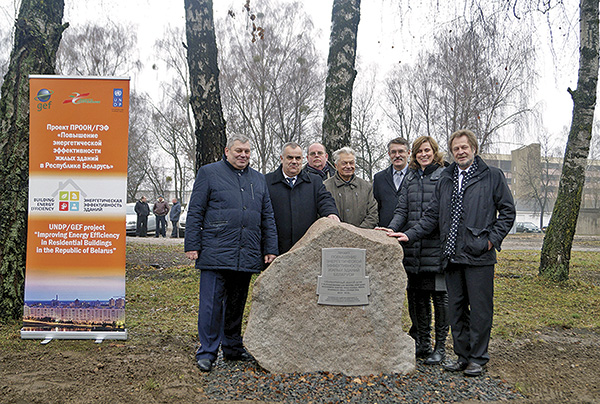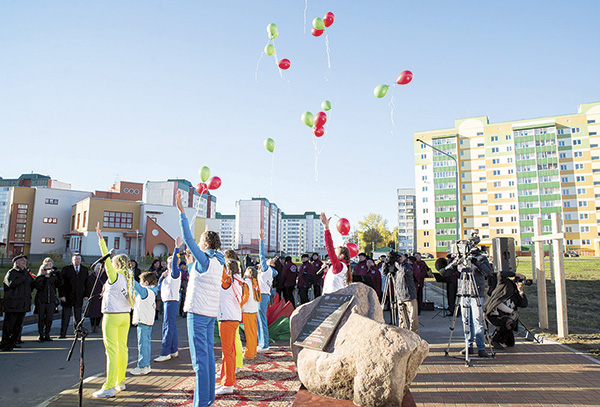The Plan, including measures to fulfil recommendations made by the Third Environmental Performance Review (EPR), prepared by the UN Economic Commission for Europe, has been approved by the Government, reaffirming the country’s strong commitment to the EPR process.

The Third EPR highlights a number of Belarus’ achievements, including: the reduction of air pollution from mobile sources; the proclamation of newly protected areas; the integration of environmental education and education for sustainable development in formal, non-formal and informal education; and the stability of the institutional framework for environmental protection, to ensure consistent development and implementation of environmental policies.
It also recognizes progress in improving the quality of environmental legislation. Among key areas for improvement, the Review identifies public participation in strategic planning and the introduction of economic incentives to facilitate the renewal of an ageing transport fleet.
The Action Plan for 2016–2020 defines activities and measures to be implemented by 16 central Government bodies, as well as regional and local authorities. In particular, such measures include further developing the national framework for public participation in environmental decision-making, setting up the national ecological network, and optimising waste management infrastructure. Many measures go far beyond the environmental area and refer to improvements to the energy, transport, forestry, tourism, housing and health sectors. The aim is to ensure sustainable management of natural resources, as well as preservation of the environment and protection of human health.

Opening of a memorial sign at the place of a future second generation energy efficiency house in Grodno, December 2015
In the forestry sector, the Action Plan provides for the annual construction of at least 100 kilometres of forest roads. Belarus has wide areas currently inaccessible, due to marshy terrain. At present, forest road density stands at 6km per 1,000 hectares of forest, which is low compared with the European average of 20km per 1,0000 hectares. Low forest road density can negatively impact sustainable management of forests, since it inspires overexploitation of forest situated close to roads. This brings associated negative environmental impact, reducing forest productivity in such areas and increasing costs of harvesting in the long term.
While Belarus is party to most multilateral environmental agreements, envisaged actions will facilitate its participation in remaining agreements. Steps are also defined to ensure stronger application of the principles of the Shared Environmental Information System (SEIS).
Many examples of co-operation already exist. The UNECE Committee on Environmental Policy approved the recommendations of the report on October 29th, 2015. The Third EPR of Belarus has been financially supported by the German Federal Ministry for the Environment, Nature Conservation, Building and Nuclear Safety and by the German Federal Environment Agency. There has been funding by the Advisory Assistance Programme (AAP) and by the Governments of Norway and Switzerland. The Ministry of Social Affairs, Health and Women’s Rights of France has delegated an expert on health and environment issues for the review, and the United Nations Environment Programme has provided an expert on biodiversity. The United Nations Development Programme (UNDP) office in Belarus has provided organisational support to the review mission.
The UNDP is playing an important role in increasing energy efficiency, partnering the Belarusian government. In particular, since 2013, the UNDP in Belarus has promoted the implementation of a project on ‘Improving Energy Efficiency in Residential Buildings’, financed by the Global Environment Facility (GEF). The main objective is to create conditions to reduce energy consumption and GHG emissions within multi-storey residential buildings. Participants are developing and introducing new designs for building and maintaining housing stock, using new technical solutions for engineering systems, and arranging amendments to regulatory legal acts. This should reduce energy consumption from heating, ventilation and hot water supply in new buildings by at least 70 percent in comparison with housing built before 1993, and by at least 40 percent in comparison with housing built according to current energy consumption requirements.

Round table on building energy certification, November 2015
Until recently, GDP energy intensity has been reduced in Belarus mainly by raising energy efficiency at production level. Energy saving in the residential sector has become a priority over the last few years, especially since the government adopted the Integrated Programme for the Design, Construction and Reconstruction of Energy Efficient Residential Buildings.
The programme assumes that, by 2020, all new residential buildings will be equipped with systems of recycling exhaust air, at least halving consumption of heat energy in new residential buildings (in comparison with the average indicator at present).
Despite builders having access to modern materials and equipment, the transition to mass construction of energy efficient buildings has been restrained by insufficient development of a regulatory legal base and by domestic companies’ limited experience of designing and constructing such buildings. The UNDP-GEF project focuses on improving standards and increasing knowledge of modern practice, as well as the distribution of advanced experience.
Alexander Grebenkov, Project Manager, tells us, “We cannot disseminate experience in raising buildings’ energy efficiency without a regulatory framework being introduced, offering technical solutions. Building standards in Belarus are quite modern already, meeting European standards in many respects. However, these regulations are not currently obligatory. Technical regulations on ‘Energy Efficiency of Buildings’ are now being developed, with the assistance of project experts."

Opening of a memorial sign at the place of a future energy efficiency house in Mogilev,
October 2015
Energy audit controls are being implemented with older buildings, looking at regulatory requirements and energy consumption. In fact, this is the first time that such energy inspection has been carried out, with 55 buildings, across varying years of construction. Recommendations on improving such energy audits of residential buildings will be prepared from the results.
The project also has an educational component. Over 500 people have taken part in events since 2013, via training sessions, seminars, conferences, and master classes for designers, builders and operating organisations. The aim is to transfer energy effective building experience to the greatest possible number of professionals.
During project realisation, the experience of designing of houses with minimal energy consumption has been studied, and modern solutions for heating and hot-water supply offered. Experts have put together recommendations for the content of training courses at some universities: on the design, building and maintenance of energy effective buildings. The Belarusian National Technical University already gives lectures in these directions, with Brest Technical University planning to follow suit. Also important is PR, for adult and youth audiences, and training abroad.
During foreign informative-training trips, Belarusian experts have been able to familiarise themselves with the modern regulatory base for energy efficient house construction, as well as innovative design procedures, and the design, building and monitoring of energy efficient residential buildings. They have been able to study the use of new technical solutions, including renewable energy sources, for heating homes and the water used in them.
Three new generation energy efficient houses are being built, following designs funded by the UNDP-GEF project and using its expert input. The base project for all buildings is guided by operating standards of building, including rules for connection to centralised heating systems and hot water supply, and the installation of radiators, thermostatic valves and heat meters as standard parameters.
The UNDP-GEF project is reimbursing 15 percent of costs (in relation to base investment cost) involved in making buildings more energy efficient, including a number of new engineering systems. Door-to-door forced ventilation (using up to 80 percent of heat from exhaust air) will be applied to heating systems. Meanwhile, water heating is being facilitated via thermal pumps, and recycling ground heat, through foundation piles, from the warmth of sewage effluent, from heat exchangers, and from solar panels. The latter can provide electricity for thermal pumps and ventilators, as well as for illumination of hallways and stairwells. In pilot objects, heat consumption via the hot water supply should fall by at least 40 percent.
“These three houses in Minsk, Mogilev and Grodno represent a practical experiment. All today`s available and economically feasible energy-saving technologies will be applied, and we’re sure that the visible results will bring more attention than theoretical estimations. According to our calculations, total utility costs in these houses shall fall considerably. In the house in Mogilev, approximately Br55 million should be saved,” Alexander Grebenkov asserts.
By Veniamin Mikheev











